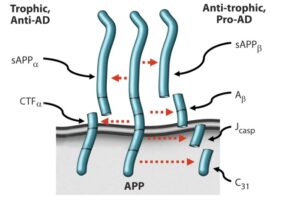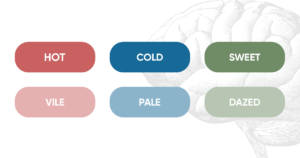The Alzheimer’s Misconception
Some experts will tell you that we don’t know the cause of Alzheimer’s. That’s an interesting statement because it’s a singular statement: “the cause.” Who said it’s going to be one cause?This is where there’s a big and fundamental point being missed. Alzheimer’s is one of the most complex, chronic illnesses.
At APRP, we believe the entire approach to treating Alzheimer’s has been based on a fundamental misconception: that Alzheimer’s is a simple disease—like pneumonia or tuberculosis—so we just need to find the cause, develop a drug, and write the prescription. This misunderstanding has caused the standard of care to be completely backwards: we are told not to check our genetic susceptibility because nothing can be done; we are told that there is no effective treatment, and so we delay our evaluation and treatment; when we develop symptoms, the physician does not do the very tests that are critical for understanding what caused the symptoms; and we are treated with ineffective drugs that do not target the cause(s) of the disease.
In contrast, our approach is derived from basic research, and has produced unprecedented improvements in patients with cognitive decline: everyone should check his/her genetic susceptibility because prevention that targets the correct risk factors for each person is highly successful; for anyone in whom symptoms appear, the earlier that evaluation and treatment are begun, the more likely that complete and sustained recovery will occur, so early evaluation is critical; the testing done by the physician must target the root cause contributors such as insulin resistance, chronic pathogens, specific toxins, and vascular disease; and optimal treatment must include a personalized, precision medicine protocol that addresses the drivers of the disease.
Research
Dr. Dale Bredesen’s thirty years of clinical research into the mechanisms of neurodegenerative diseases has led him to conclude that:
- Alzheimer’s results from an imbalance in the brain’s neuroplasticity signaling. As we age and are exposed to multiple toxic assaults, over time, the damaging forces (synaptoclastic) overtake the repair forces (synaptoblastic), and our brains begin to downsize and function poorly.
- At its core, Alzheimer’s is what happens when the brain tries to protect itself from metabolic and toxic threats like inflammation, shortage of supportive nutrients, or exposure to toxins substances. So it is actually a defensive system to protect the brain. Eliminating these threats can stop AD in its tracks and will do far more for someone suffering than just alleviate symptoms.
The goal of our laboratory research was to understand the fundamental nature of the neurodegenerative process, in the hope that we may be able to translate this understanding to fashion the first effective treatments. We discovered that, contrary to the standard claim that “there is no known cause of Alzheimer’s,” there are actually dozens of potential contributors to this disease, and thus what drives Alzheimer’s differs from person to person.
As we started to evaluate these various potential contributors for each patient, we initially noted three different groups, but we now know about 6:
- Type 1 or inflammatory Alzheimer’s may be associated with a chronic infection or other causes of inflammation;
- type 2 of atrophic Alzheimer’s is associated with deficiency in growth factors, hormones, or nutrients;
- type 1.5 or glycotoxic has both inflammatory features and atrophic features since it is associated with high sugar intake, which leads to both insulin resistance (insulin is an important growth factor for brain cells) and glucose damage to proteins (called glycation, which is what is measured by hemoglobin A1c);
- type 3 is toxic, and may be associated with toxicity from metals, air pollution, organic solvents, or biotoxins (which are often produced by specific mold species);
- type 4 is vascular and associated with blood vessel damage that limits blood flow to the brain; and
- type 5 is traumatic, associated with previous head trauma.
Prevention and treatment of Alzheimer’s and pre-Alzheimer’s conditions works best when these specific types are identified and addressed for each person, using a precision medicine protocol, which we dubbed ReCODE (for reversal of cognitive decline).
TedX Manhattan Beach
See Dr. Bredesen’s TedX talk given at Manhattan Beach entitled “A Precision Approach to End Alzheimer’s Disease.” In this presentation, Dr. Bredesen shares his belief that this will be the last generation to fear Alzheimer’s and details how a precision approach to treatment can reverse cognitive decline.

Published Research
Many people are unaware or simply deny that early stage Alzheimer's, and its precursors, mild cognitive impairment (MCI) and subjective cognitive impairment (SCI), are now preventable, and the associated cognitive decline often reversible.
Dr. Dale Bredesen’s precision medicine approach, the ReCODE (Reversal of COgnitive DEcline) protocol, is based on years of research and backed by published evidence. Clinical application of this research led to the first reversals of cognitive decline, published in 2014, 2016, and 2018. There are now over 3000 patients on this protocol, with unprecedented improvements documented. An analogous approach has been developed for other degenerative diseases such as macular degeneration and Lewy body disease.
Reversal of Cognitive Decline In Alzheimer’s Disease
AGING, June 2016, Vol. 8 No. 6 Abstract: Alzheimer’s disease is one of the most significant healthcare problems nationally and globally. Recently, the first description of the reversal of cognitive decline in patients with early Alzheimer’s disease or its precursors, MCI (mild cognitive impairment) and SCI (subjective cognitive impairment), was published [1]. The therapeutic approach…
Read MoreReversal of Cognitive Decline: A Novel Therapeutic Program
AGING, September 2014, Vol. 6 No. 9 Abstract: This report describes a novel, comprehensive, and personalized therapeutic program that is based on the underlying pathogenesis of Alzheimer’s disease, and which involves multiple modalities designed to achieve metabolic enhancement for neurodegeneration (MEND). The first 10 patients who have utilized this program include patients with memory loss…
Read MorePrevention | Reversal
This is not just about lifestyle changes, this is about identifying and treating what is causing the problem.
The ReCODE program utilizes a personalized, precision-medicine approach for prevention and early reversal of Alzheimer’s and enhancement of cognitive ability at every age. A 21st-century‘ vaccine’ for Alzheimer’s disease, it works by first identifying all of the risk factors for Alzheimer’s and cognitive decline and then addressing and treating each one. The goal is to change one’s biochemistry to provide optimal conditions for the brain to thrive.
<36 holes image>
Identify the contributors to the decline: what are the suboptimal factors (pathogens, toxins, genomics, inflammagens, nutrients, etc.) for each person.
Simplifying the Bredesen Protocol
By Julie Gregory, Chief Health Liaison for Apollo Health. Hi friends- “Summer’s here, and the living is easy.” But is it really? Especially for those who’ve recently begun practicing the protocol, it can sometimes feel pretty overwhelming. Your old way of eating and living often change pretty dramatically, depending upon your starting place. Even those that have been using…
Read MoreThe Six Types of Alzheimer’s Disease
Determining if you have Alzheimer’s disease does not help you to avoid it or reverse it. Instead, determining why you have Alzheimer’s is key to developing a treatment plan. As we have learned, there are at least 36 contributors to cognitive decline. Most people who already have Alzheimer’s disease or MCI (mild cognitive impairment, the harbinger of Alzheimer’s) or…
Read MoreReCODE Report
Prevention
Cognoscopy
Cognoscopy, a term coined by Dr. Bredesen, is a series of blood tests and a simple online cognitive assessment to reveal risk for Alzheimer’s. We recommend that everyone who is 45 years or older get a cognoscopy (just as it is recommended that everyone 50 or over get a colonoscopy) so that everyone can prevent Alzheimer’s disease.
PreCODE, short for prevention of cognitive decline, is a program that evaluates the key risk factors for cognitive decline, such as genetics, inflammation, insulin resistance, nutrients, hormones, and other risk factors, then uses a computer-based algorithm to determine risk for each of the subtypes of Alzheimer’s disease and offer an optimal, personalized protocol for prevention.
Reversal
For those who have already developed symptoms, we recommend the ReCODE protocol for reversal instead of prevention.
ReCODE - (Pull from AH site)
A critical component of the protocol is the ReCODE Report, a diagnostic tool that uses a proprietary computer-based algorithm to analyze key blood tests, cognitive assessments, and genome types. The Report identifies levels of Alzheimer’s risk, subtype, and an optimal program for prevention or reversal.
Proof Points
Personal Testimonials
“It has been said that everyone knows someone who has survived cancer, but no one knows anyone who has survived Alzheimer’s. We are now seeing some of the first survivors.”
Hear directly from doctors, coaches, caregivers, and patients.
From the patient’s perspective, it is a simple equation: I can go to an accepted center and receive standard care, in which case I am 100% certain I will not improve; or I can go to a clinic demonstrating anecdotal improvements, in which case I may improve.
Practitioner Success Stories




